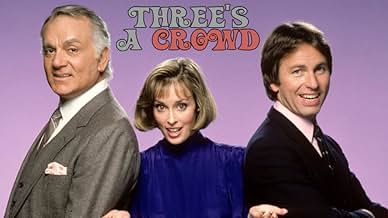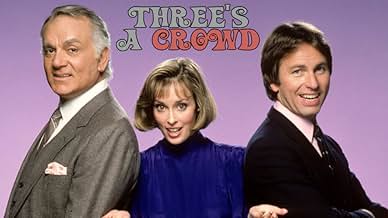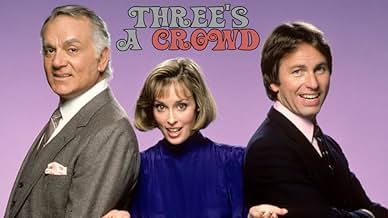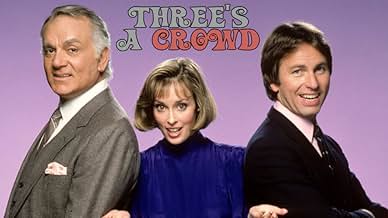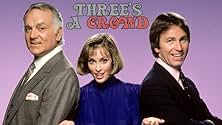ÉVALUATION IMDb
5,7/10
1,1 k
MA NOTE
La cohabitation de Jack Tripper avec Vicky Bradford est compliquée par l'ingérence de son père hostile en tant que propriétaire de Jack.La cohabitation de Jack Tripper avec Vicky Bradford est compliquée par l'ingérence de son père hostile en tant que propriétaire de Jack.La cohabitation de Jack Tripper avec Vicky Bradford est compliquée par l'ingérence de son père hostile en tant que propriétaire de Jack.
Parcourir les épisodes
Avis en vedette
Just finished a Three's Company marathon, complete with spin-offs (I also wrote a review for The Ropers).
TAC is not as bad as some other reviewers have stated, but it's certainly a letdown after Three's Company. It doesn't help that by the time Season 8 of Three's Company came around, the show had grown a bit stale: still enjoyable but running out of steam. That does not make for a great hand-off to the new show.
And the new show is in a lot of ways the same as the old show, only much more tepid. Mary Cordette as Vicki Bradford, Jack's girlfriend, is perfectly fine, but comedy is not her metier. Robert Mandan as Mr. Bradford is a pro. His presence is stabilizing, as is the reoccurring role of Jessica Walter as Claudia, Vicki's mother. Alan Campbell as Jack's surfer-dude sous-chef is a bit grating.
But tepidity is the issue. The show doesn't know what it wants to be. The first five or six episodes are sluggish because they mostly continue the new-couple-in-love storyline that, quite frankly, dragged down the final episodes of Three's Company. In fact, this rom-com-lite feel permeates the entire single season of TAC. Other times, the show tries to go for the tried-and-true formulae of TC: the physical pratfalls of Ritter, the double-entendres, the overheard conversations, the misunderstood conversations. Occasionally, they are hilarious, and one is briefly reminded of the pure farce of TC.
Farce. That's what I and so many viewers loved about TC. The original show did not try to be serious. It did not try to lecture or pander. It refused to turn mawkish or maudlin (NOTE: The show's final hour-long episode is an exception, awkwardly going for gush instead of gut-busting laughs). TAC, thus, is in an awkward position. If it tries to rehash TC's blueprint, it risks being lambasted as unoriginal. If it tries to go in a different direction--lukewarm and fuzzy romance with dashes of humor added in--the show is also painted into a corner.
Nonetheless, the show is far from awful. In fact, it finds its semi-stride for a number of mid-season episodes. TAC is harmless and nostalgic, especially for anyone, like me, who misses Ritter, Three's Company, and 80s neon fashion!
TAC is not as bad as some other reviewers have stated, but it's certainly a letdown after Three's Company. It doesn't help that by the time Season 8 of Three's Company came around, the show had grown a bit stale: still enjoyable but running out of steam. That does not make for a great hand-off to the new show.
And the new show is in a lot of ways the same as the old show, only much more tepid. Mary Cordette as Vicki Bradford, Jack's girlfriend, is perfectly fine, but comedy is not her metier. Robert Mandan as Mr. Bradford is a pro. His presence is stabilizing, as is the reoccurring role of Jessica Walter as Claudia, Vicki's mother. Alan Campbell as Jack's surfer-dude sous-chef is a bit grating.
But tepidity is the issue. The show doesn't know what it wants to be. The first five or six episodes are sluggish because they mostly continue the new-couple-in-love storyline that, quite frankly, dragged down the final episodes of Three's Company. In fact, this rom-com-lite feel permeates the entire single season of TAC. Other times, the show tries to go for the tried-and-true formulae of TC: the physical pratfalls of Ritter, the double-entendres, the overheard conversations, the misunderstood conversations. Occasionally, they are hilarious, and one is briefly reminded of the pure farce of TC.
Farce. That's what I and so many viewers loved about TC. The original show did not try to be serious. It did not try to lecture or pander. It refused to turn mawkish or maudlin (NOTE: The show's final hour-long episode is an exception, awkwardly going for gush instead of gut-busting laughs). TAC, thus, is in an awkward position. If it tries to rehash TC's blueprint, it risks being lambasted as unoriginal. If it tries to go in a different direction--lukewarm and fuzzy romance with dashes of humor added in--the show is also painted into a corner.
Nonetheless, the show is far from awful. In fact, it finds its semi-stride for a number of mid-season episodes. TAC is harmless and nostalgic, especially for anyone, like me, who misses Ritter, Three's Company, and 80s neon fashion!
After fantastic 8 seasons of "Three's company" I was left disappointed with how the things wrapped up for the gang - the creators basically crumpled Terri & Janet's character's exits from the show instead focusing the last episodes on Jack and his new relationship with Vicky almost completely. Suffice it to say that Three's a crowd felt out of place and none of the cast members (except Richard Klein's Larry) ever appeared on the show or were even mentioned by name once: after so much time together the creators could have at least acknowledged their own characters with a line or two. Besides this fact the series was flat, tired and uninspiring and there are only 3-4 episodes out of the whole season of 22 that really stand out - all the rest is filler leading the characters nowhere; multiple episodes ended without proper resolution of the story arcs - so what was the point of this whole show? Beats me. Though there was a nice addition to the cast in the face of E.Z. character played marvellously by Alan Campbell and John Ritter and Mary Cadorette were a great on-screen couple, they sadly got their chemistry wasted on this mess of a TV spin-off of a far superior original.
Three's a Crowd is boring, direction-less, and painfully unfunny. The producers made no attempt to create a new and exciting vehicle for John Ritter's brilliant physical comedy, they were simply coasting on the laurels of Three's Company's success.
Three's a Crowd obviously couldn't have featured any of the dynamics that made Three's Company so hilarious like the sexual tensions and misunderstandings that come as a result of a man living with two women; not to mention Jack's charade of pretending that he was gay around Mr. Roper, and later Mr. Furley, so he could go on living in the apartment. So what did they do to make up for those missing attributes on this spin-off?
Nothing. The Jack Tripper of this show is barely the same character from Three's Company. The overzealous, yet lovable klutz is rarely seen here. Instead, Jack is a boring husband and business owner nearing middle-age. His wife, Vicki, played by Mary Cadorette, is equally as uncharismatic. We get to see glimpses of the old Jack in the episodes, "Jack Gets Trashed" and "A Star Is Born" but these sightings are too few and far between. In fact, Jack is even used as a straight man to wackier characters like his chef, E.Z. Taylor.
E.Z., a Spicoli-like surf bum is more annoying than funny. Why didn't they use Felipe Gomez, the reoccurring character from seasons 5 to 7 of Three's Company, for the chef? Not only was that character hilarious but he shared an awesome chemistry with Jack. I guess that pairing would have worked too well.
Jack's antagonistic relationship with his father-in-law, Mr. Bradford, played by Robert Mandan of Soap, would have been more entertaining if we hadn't seen it done before. They share the exact same discord that Jack had with Mr. Angelino, only not near as amusing.
Jack's mother-in-law, Claudia, played by Jessica Walter, is on this show for the sole purpose of exchanging clichéd ex-spouse jokes with Mr. Bradford. Henny Youngman should have sued the show just on the basis of these two characters stealing his material.
It's no shock that this show only lasted a single season. The only great thing about Three's a Crowd is that it gives us much more of an appreciation for Three's Company.
Three's a Crowd obviously couldn't have featured any of the dynamics that made Three's Company so hilarious like the sexual tensions and misunderstandings that come as a result of a man living with two women; not to mention Jack's charade of pretending that he was gay around Mr. Roper, and later Mr. Furley, so he could go on living in the apartment. So what did they do to make up for those missing attributes on this spin-off?
Nothing. The Jack Tripper of this show is barely the same character from Three's Company. The overzealous, yet lovable klutz is rarely seen here. Instead, Jack is a boring husband and business owner nearing middle-age. His wife, Vicki, played by Mary Cadorette, is equally as uncharismatic. We get to see glimpses of the old Jack in the episodes, "Jack Gets Trashed" and "A Star Is Born" but these sightings are too few and far between. In fact, Jack is even used as a straight man to wackier characters like his chef, E.Z. Taylor.
E.Z., a Spicoli-like surf bum is more annoying than funny. Why didn't they use Felipe Gomez, the reoccurring character from seasons 5 to 7 of Three's Company, for the chef? Not only was that character hilarious but he shared an awesome chemistry with Jack. I guess that pairing would have worked too well.
Jack's antagonistic relationship with his father-in-law, Mr. Bradford, played by Robert Mandan of Soap, would have been more entertaining if we hadn't seen it done before. They share the exact same discord that Jack had with Mr. Angelino, only not near as amusing.
Jack's mother-in-law, Claudia, played by Jessica Walter, is on this show for the sole purpose of exchanging clichéd ex-spouse jokes with Mr. Bradford. Henny Youngman should have sued the show just on the basis of these two characters stealing his material.
It's no shock that this show only lasted a single season. The only great thing about Three's a Crowd is that it gives us much more of an appreciation for Three's Company.
I was a big fan of Joyce DeWitt on Three's Company, but a Jack and Janet spin off just wouldn't have worked for several reasons. First of all, over the course of the series the relationship between Jack and the female roommates moved strongly in the direction of a brother-sister relationship instead of the romantic one. To see these pseudo-siblings married might have seemed as out of place as a Brady Bunch spin off called "Greg Loves Marcia".
The second reason it would have failed is that "Three's Company" broke some social TV taboos in its day, so the successor should break some in its own day. Back in the 80s, the controversial trend was to dismiss the concept of marriage with the idea that you didn't need a contract from the government in order to be in a committed loving relationship (yet oddly enough the controversial trend in our current decade is the opposite belief) so having Jack shack up with a woman was the next logical step. Jack living with Janet, however, would not have made sense because both characters had previously expressed value in the concept of marriage and we've already seen them living together for the past 7 years. What would we gain, especially when her parents already like Jack! A third reason it wouldn't have worked is that the entire franchise was based upon the British "Man About the House" franchise. I understand the value in copying the core concept, but I don't know why the producers continued mirroring that franchise. (Legal reasons perhaps?) At any rate, "Three's A Crowd" was designed after "Robin's Nest" and trying to force Janet and her family into those roles would have been awkward. The bitter relationship between the parents of Jack's girlfriend was key to the reason behind their living together and it was also the source of a lot of comedy with the un-Father-in-Law. (It's odd. Vicki wanted this arrangement so that they were living together because they wanted to live together instead of being forced to live together. Apparently splitting up a relationship where two people share the same living environment, property, bills, and possibly kids is only difficult if that couple is married) We already met Janet's parents and they seemed fairly contented with each other... and fairly boring too.
I also think the producers wanted to get lots of fresh blood into the mix. If the female lead was Janet the name of the series might as well have been called "Three's Company Lite". (Though the series "Angel" did show that you can create a new series with a cast comprised completely from a subset of the cast of another show yet still have it feel like its own show) But all my arguments are a moot point considering that the series did fail.
The second reason it would have failed is that "Three's Company" broke some social TV taboos in its day, so the successor should break some in its own day. Back in the 80s, the controversial trend was to dismiss the concept of marriage with the idea that you didn't need a contract from the government in order to be in a committed loving relationship (yet oddly enough the controversial trend in our current decade is the opposite belief) so having Jack shack up with a woman was the next logical step. Jack living with Janet, however, would not have made sense because both characters had previously expressed value in the concept of marriage and we've already seen them living together for the past 7 years. What would we gain, especially when her parents already like Jack! A third reason it wouldn't have worked is that the entire franchise was based upon the British "Man About the House" franchise. I understand the value in copying the core concept, but I don't know why the producers continued mirroring that franchise. (Legal reasons perhaps?) At any rate, "Three's A Crowd" was designed after "Robin's Nest" and trying to force Janet and her family into those roles would have been awkward. The bitter relationship between the parents of Jack's girlfriend was key to the reason behind their living together and it was also the source of a lot of comedy with the un-Father-in-Law. (It's odd. Vicki wanted this arrangement so that they were living together because they wanted to live together instead of being forced to live together. Apparently splitting up a relationship where two people share the same living environment, property, bills, and possibly kids is only difficult if that couple is married) We already met Janet's parents and they seemed fairly contented with each other... and fairly boring too.
I also think the producers wanted to get lots of fresh blood into the mix. If the female lead was Janet the name of the series might as well have been called "Three's Company Lite". (Though the series "Angel" did show that you can create a new series with a cast comprised completely from a subset of the cast of another show yet still have it feel like its own show) But all my arguments are a moot point considering that the series did fail.
I don't understand why this show wasn't a hit, It only lasted one season, In my opinion it was slightly funnier than Three's Company. I taped many episodes about three years ago when a local channel aired it in syndication. Oh well...
Le saviez-vous
- AnecdotesThe production of this series caused tension on the set of Vivre à trois (1976) between John Ritter and the rest of the cast. The producers tried to keep it a secret from the rest of the cast. But they eventually found out and were disappointed that the series would essentially continue without them.
- Autres versionsSome syndicated repeats aired under the title "Three's Company Too" with the theme song replaced with the theme from Vivre à trois (1976).
- ConnexionsFeatured in WatchMojo: Top 10 Worst TV Spin-Offs (2014)
Meilleurs choix
Connectez-vous pour évaluer et surveiller les recommandations personnalisées
- How many seasons does Three's a Crowd have?Propulsé par Alexa
Détails
- Date de sortie
- Pays d’origine
- Langue
- Aussi connu sous le nom de
- Three's Company, Too
- Lieux de tournage
- sociétés de production
- Consultez plus de crédits d'entreprise sur IMDbPro
Contribuer à cette page
Suggérer une modification ou ajouter du contenu manquant

Lacune principale
By what name was Three's a Crowd (1984) officially released in India in English?
Répondre
